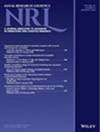Optimal condition‐based parameter learning and mission abort decisions
IF 2.1
4区 管理学
Q3 OPERATIONS RESEARCH & MANAGEMENT SCIENCE
引用次数: 0
Abstract
Unexpected failures of safety‐critical systems during mission execution are not desirable in that they often result in severe safety hazards and significant financial losses. Prompt mission abort based on real‐time degradation data is an effective means to prevent such failures and enhance system safety. In this study, we focus on safety‐critical systems that experience cumulative shock degradation and fails when the degradation exceeds a failure threshold. Real‐time degradation measurements are obtained via sensor monitoring, which are stochastically related to the hidden degradation parameters that vary across components. We formulate the optimal mission risk control problem as a sequential abort decision‐making problem that integrates adaptive parameter learning, following which a dynamic Bayesian learning approach is exploited to sequentially infer the uncertain degradation parameters by utilizing real‐time sensor data. The problem is constituted as a finite horizon Markov decision process to minimize the expected costs associated with inspections, mission failures and system failures. We derive a series of structural properties of the value function and demonstrate the existence of optimal abort thresholds. In particular, we establish that the optimal policy follows a state‐dependent control limit policy. Additionally, we study the existence and monotonicity of control limits associated with both the number of inspections and degradation severities. We demonstrate the performance of the proposed risk management policy through comparative experiments that show substantial superiorities over risk‐induced loss control.基于条件的最优参数学习和任务中止决策
安全关键型系统在执行任务过程中出现意外故障是不可取的,因为这往往会造成严重的安全隐患和巨大的经济损失。根据实时退化数据及时中止任务是防止此类故障和提高系统安全性的有效手段。在本研究中,我们将重点放在安全关键型系统上,这些系统会经历累积冲击降级,当降级超过失效阈值时就会失效。通过传感器监测获得实时退化测量值,这些测量值与隐藏的退化参数随机相关,而这些退化参数在不同组件之间存在差异。我们将最优任务风险控制问题表述为一个整合了自适应参数学习的顺序中止决策问题,然后利用动态贝叶斯学习方法,通过实时传感器数据顺序推断不确定的退化参数。该问题是一个有限视界马尔可夫决策过程,旨在最大限度地降低与检查、任务失败和系统故障相关的预期成本。我们推导出了价值函数的一系列结构特性,并证明了最优中止阈值的存在。特别是,我们确定了最优策略遵循与状态相关的控制极限策略。此外,我们还研究了与检查次数和退化严重程度相关的控制限制的存在性和单调性。我们通过对比实验证明了所提出的风险管理政策的性能,实验结果表明它比风险导致的损失控制有很大的优越性。
本文章由计算机程序翻译,如有差异,请以英文原文为准。
求助全文
约1分钟内获得全文
求助全文
来源期刊

Naval Research Logistics
管理科学-运筹学与管理科学
CiteScore
4.20
自引率
4.30%
发文量
47
审稿时长
8 months
期刊介绍:
Submissions that are most appropriate for NRL are papers addressing modeling and analysis of problems motivated by real-world applications; major methodological advances in operations research and applied statistics; and expository or survey pieces of lasting value. Areas represented include (but are not limited to) probability, statistics, simulation, optimization, game theory, quality, scheduling, reliability, maintenance, supply chain, decision analysis, and combat models. Special issues devoted to a single topic are published occasionally, and proposals for special issues are welcomed by the Editorial Board.
 求助内容:
求助内容: 应助结果提醒方式:
应助结果提醒方式:


